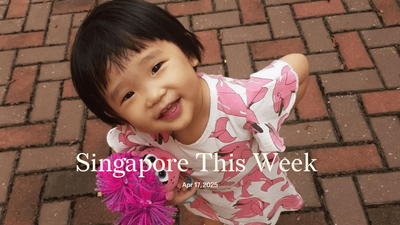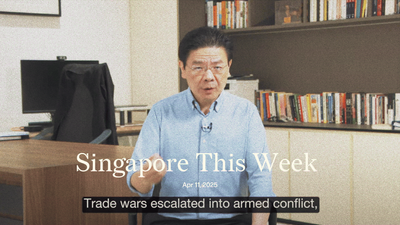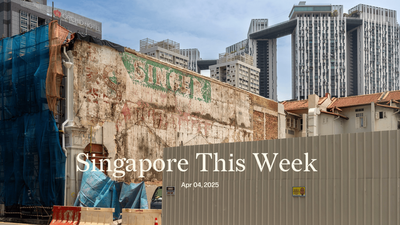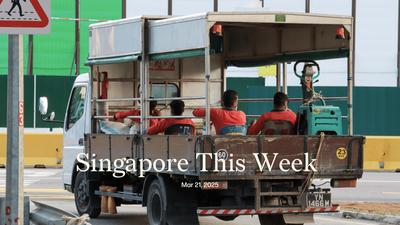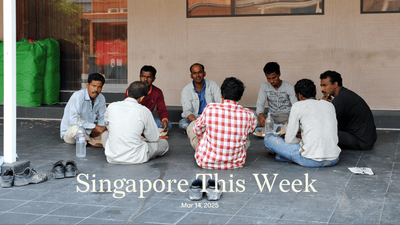Politics: Unanimity in the House
For the first time in three years, all members of Parliament (MPs) last week voted in favour of the Budget. This includes 79 MPs from the ruling People’s Action Party (PAP), eight MPs from The Workers’ Party, and two non-constituency MPs from the Progress Singapore Party. Jom had previously called the bumper S$131.4bn budget a “birthday angpao before you vote”. It was launched on an auspicious date (ren ri, everybody’s birthday in the Chinese zodiac); and presented by Lawrence Wong, the finance minister, who’ll lead the PAP in the upcoming general election (that must be called by November 2025, but that may be as soon as September this year). Its long list of goodies will benefit everybody from corporations and professionals to low-wage workers and seniors. Opposition MPs had disagreed with the previous two budgets because of the goods and services tax hike. This year, despite some notable rebuttals, particularly from the WP’s He Ting Ru, they all voted in favour of it. It’s a point worth remembering simply to counter the false narrative, often peddled by PAP supporters ahead of elections, that opposition MPs oppose the government just for the sake of it. Not true. It seems like we’re all pleased with our birthday angpao.
Society: Welcome to the age of the ‘only child’
Singaporean couples prefer to have just one kid, particularly when the other aspirations that pertain to achieving an “ideal family” aren’t fulfilled, an international survey of over 22,000 people across eight countries has found. A family may choose to invest more resources in fewer children, so as to maximise the impact of household income, fulfil the educational desires of their children, and improve the quality of relationships among family members. Respondents also value egalitarian gender roles and a fair division of labour, over, say, a situation where the woman is part of a dual-income household but also responsible for domestic work. “Our experiments clearly show that individuals value multiple family attributes, which may conflict with each other when resources are limited,” the study, “Family ideals in an era of low fertility”, said.
Last year, Singapore’s resident total fertility rate dropped below 1.0 (0.97) for the first time. The city-state’s long-drawn predicament is often attributed to the government’s successful “Stop at Two” campaign from 1972 to 1987. This then bled into broader socio-economic challenges that have crimped fertility rates across East Asia as the region developed, including economic precarity and changing social norms, such as the decline of marriage amid persistent taboos against non-traditional family structures. Faced with shrinking and ageing populations, policymakers have scrambled to reverse plummeting birth rates, rolling out incentives to encourage couples to procreate. But throwing money at the problem—from “baby bonuses” and increased paid parental leave, to more affordable childcare services and flexible work arrangements—hasn’t necessarily achieved the desired results. The study’s findings, researchers said, may explain the poor record of such policies, suggesting that fertility decisions are made on a holistic understanding of family formation.
Dominant narratives have insisted that population growth is necessary for economic growth. But civilisation’s insatiable appetite for infinite growth has often led instead to widening social inequalities, ecological degradation, as well as detrimental effects on human health. It’s perhaps no longer feasible and sustainable to produce and consume “ever more stuff”. This is why numerous public intellectuals, from Oxford economist Kate Raworth (author of Doughnut Economics: Seven Ways to Think Like a 21st-Century Economist) to Japanese, Marxist philosopher Kohei Saito (author of Slow Down: The Degrowth Manifesto) have been urging a shift away from our fixation with GDP (gross domestic product) growth. “For the twenty-first century a far bigger goal is needed: meeting the human rights of every person within the means of our life-giving planet,” wrote Raworth. Maybe having just one child isn’t that bad.
Society: A fine city
“In Singapore, many women who meet potential partners for the first time will require men to remove their pants. If they have scars on their buttocks from caning, women won’t date them,” a Chinese national said authoritatively in a video on Weibo, one of the largest social media platforms in China. Caning is used by the authorities as an effective punishment tool and even minors aren’t spared the rod, he said. This is but one example of the misinformation about Singapore’s law enforcement on Chinese social media platforms such as WeChat, Weibo and Xiaohongshu. Singapore has seen an influx of Chinese tourists since February, when the visa waiver scheme came into effect. This prompted hashtags like “visa-free travel to Singapore could result in visitors becoming poor if not careful” and “the first batch of middle-class Chinese nationals that visited Singapore visa-free are now bankrupt”, centred around the supposed high prices of bottled water, food, souvenirs, and other items.
The real “killer”, some said, are the fines—incurred, they were shocked to discover, for spitting, failing to flush the toilet, singing in public, littering, and vandalism. Some content creators have exaggerated these fines and punishments to “attract eyeballs”. One video claimed that those who consume alcohol after 10pm will be “whipped”; another video alleged that any form of vandalism of public property would result in caning “straight away”; one user even said he was fined for taking a sip of water on the MRT, and then fined again for smoking to relieve the stress of his first fine. In one poll, 888 Chinese nationals said they originally wanted to visit Singapore but were dissuaded by the fine system. Others think China should implement the same in order to “raise the calibre” of Chinese society.
It’s all reminiscent of the misinformation about Singapore and attendant polarising opinions in the US in the 1990s, after Singapore caned American Michael Fay for vandalism. Perhaps, Singapore’s biggest-ever money laundering case that involved numerous Chinese nationals has heightened this fear about our laws. Regardless of how tourists feel about them, fines aren’t going anywhere. “[Fines] are essential in ensuring that Singapore continues to be a safe and orderly place for both locals and travellers,” Andrew Phua, the Singapore Tourism Board’s executive director for Greater China, told The Straits Times. Most of us know fines function largely as a deterrent, and we certainly don’t go around checking for cane marks on the buttocks of strange men.
Society: They can’t drag you down
Decades of discrimination against LGBTQ persons in Singapore mean they are some of the most vulnerable to hate crimes and violence. Last weekend was a chilling reminder of this. Kira Moon, a drag queen, claimed to have been assaulted by a group of eight men in the wee hours of March 10th at Marina Bay Sands. Kira and her friends were looking for food after clubbing when a man called out, “bapok”, a homophobic Malay slur. After Kira confronted the man, her “head was pulled to the floor, (her) wig flew off and (her) head hit the glass panel.” Her friend “got it worst [sic]”, she claimed: “...punched, surrounded while laying on the floor and kicked (in) the face.”
Dear Straight People, a LGBT+ news platform, shared Kira’s story with the caption, “Let’s blow this matter up so the homophobes get their karma!” Some responded with victim-blaming, particularly on X (formerly Twitter). “We can’t please anyone so be decent in a way of dress hair etc if we want respect and acceptance. Be simple girly,” wrote one. For Kira, the harrowing episode brought back memories of a young self: “I am still very very traumatised by this whole thing. Really shaken. This kind of [sic] bully has happened to me all my life when I was younger - when I was in primary school, all I wanted was to leave the world because it was that bad.” Still, Kira’s overall message was one of resistance, of resolve to “be who I’m comfortable being today”, and of gratitude, for “the love and support I’ve been receiving from friends, my queer community, kindhearted strangers, media outlets and all the hundreds of reposts.” Given that Kira is assisting with an ongoing police investigation, some might be tempted to view the incident as a sign of progress—homophobes can no longer get away with their “bapok” slurs, right?
That would be a grave mistake. Instead, more than a year since the repeal of S377A, the law that criminalised sex between men, the alleged attack on Kira and friends is simply proof of how much more work we have to do. Sociologist Johan Galtung’s theory of the Violence Triangle shows how direct violence is related to structural violence, such as government policies that continue to limit queer life, and are justified by cultural violence, embedded in the norms that promote heterosexuality above all else. All injustices are interconnected. Whether it’s Singaporean educators being discouraged from affirming LGBTQ youth or housing policies that are still skewed towards heteronormative norms, we must use this moment to both interrogate the systemic forces that embolden bigots, and also assure Kira that we won’t let them drag you down.
History weekly by Faris Joraimi
It’s been a rough week for gangsters in Singapore. They’ve been mistaken for Anglo Chinese School boys, and also used to promote an Amoy Street restaurant. Gotti Italiano, named after the New York City mobster John Gotti, planned a “Hip-Hop Mafioso”-themed night. This invoked a stern rebuke from Dante Brandi, the Italian ambassador to Singapore, who thought that trivialising the mafia was in poor taste. “People have died and suffered because of it and, most importantly…[people] are still dying and suffering to fight it,” he wrote on Facebook. The Italian mafia’s long-distance connections may not reach Singapore but we are certainly no strangers to mafia-like entities. Criminal organisations long thrived in big cities like ours: major centres for trafficking illegal goods and with sufficiently large populations to support a shadow vice economy. Law enforcement was a struggle in large urban areas, as dense networks of “mean streets” created cul-de-sacs and escape routes.
At the same time, some “criminal” syndicates weren’t just violent, money-making rogues: the famous Chinese secret societies were important mutual aid organisations that supported thousands of migrants to Singapore in the 19th century. Due to the lack of welfare and services provided by the colonial authorities, the (not-so) secret societies became a source of economic and social protection. Like the Italian mafia, the secret society was a kinship structure. In the Singapore case, they did what we today expect a responsible government to do for its people, but didn’t, for want of care or resources. Lest we romanticise them, theirs was a form of benevolent and violent paternalism that usually drew sharp distinctions between insiders and outsiders. Even though today’s police mainly battle syndicates operating via online cybercrime networks, media portrayals of gangsterism continue to supply enduring tropes that repel and fascinate. Popular Malay serials from the early 2000s produced by state broadcaster Suria, Anak Metropolitan and Hanyut, dramatised the lives of youths in tattooed company.
In recent years, so-called narco tourism in Colombia, fuelled by “Narcos”, Netflix’s popular show, has generated incredible controversy and resistance. “[G]lobal imaginaries of atrocities are a deeply stratified phenomenon where powerful actors—in this case those involved in the global entertainment industry—are able to impose their accounts on local narratives in processes of collective memory construction,” wrote scholars David Rodríguez Goyes and Katja Franko in “Profiting From Pablo: Victimhood and Commercialism in A Global Society”. “...collective memory making, when embedded in the global capitalist economy, can result in re-victimisation and erect barriers that prevent certain events and groups of victims being included in the ‘common we’.” No criminal underworld is as well-represented in pop culture as the Italian mafia, of course, prompting Brandi’s parting remark to Gotti Italiano: “[T]he world can be spared from your additional literature on the subject.”
Arts: The curious case of Alvin Tan and the ‘Live Gaza Monologues’
Just hours before he was slated to be part of a panel discussion on allyship with Palestine, Alvin Tan, minister of state for culture, community and youth, withdrew from the event because he was “unwell”. Organisers Lepak Conversations, an advocacy platform, expressed “deep regret” over this on their Instagram account, and wished him a “speedy recovery”. The event went ahead last Saturday without Tan, who was replaced by Janadas Devan, director of the Institute of Policy Studies. This wasn’t the first time “The Gaza Monologues”, a heart-wrenching collection of testimonials by Palestinian youths, has been staged here; last December, Singaporean artists both live-streamed and recorded several editions.
Yet, this particular event was not without controversy. Given that Singapore has banned public events and assemblies related to the ongoing Israel-Hamas war, organisers presumably were reassured to have the government’s imprimatur on this one. Yet, after news of Tan’s planned attendance emerged, Singaporeans took to social media to express concerns over the asymmetrical power dynamic that a PAP politician’s presence might create at the event, concerned that Tan would “parrot govt-approved narratives”. They pointed out Tan’s appearance at the Singapore Air Show, which included Israeli defence firms, and questioned the sincerity of his “solidarity” with the Palestinian cause, suggesting that “engaging POHs [public office holders] in a pro-Palestine event is an exercise in futility at best.” Critics also singled out the event’s partnership with REACH, the government’s official feedback unit, and worried that the Singapore Red Cross, recipient of event proceeds, might direct funds towards Israeli emergency coffers instead. The organisers reiterated that funds would go towards the Palestine and Egyptian Red Crescent Societies, and that their collaboration with REACH was “to carry out the public community event safely in accordance [with] laws and regulations.”
Nevertheless, what’s encouraging is how Singaporeans are learning to widen the practice of advocacy in the narrow spaces it’s permitted. Political science professor Walid Jumblatt Abdullah, host of the popular talk show “Teh Tarik with Walid” (and Jom endorser), interviewed audience members at the event. One of them, visibly moved, responded: “Emotions are actually very powerful. It is when you are in touch with your emotions that you are able to galvanise and organise yourself to speak up and do something.”
Arts: ‘No questions asked’ theatre tickets
This checkpoint doesn’t want to be your gatekeeper. Checkpoint Theatre has launched a new ticketing scheme called “No Questions Asked” (NQA), where those who can’t afford a theatre ticket can book a complimentary one. The honour-based, first-come-first-served system trusts audiences “to act with integrity and help us ensure that NQA tickets get to theatre-lovers who genuinely can’t afford a ticket”, the company wrote. NQA bookings for their upcoming production of “Secondary: The Musical” close March 19th. The scheme has been garnering plaudits from artists and audience members here, and echoes other sliding-scale and discounted ticketing tiers that local arts groups have implemented to make their productions more accessible to students and other financially strapped demographics. The Necessary Stage, another local theatre company, has been matching beneficiaries and donors since 1992 through The Triangle Project, where cash sponsorship is used to purchase tickets for audience members from various charities and voluntary welfare organisations. The Singapore International Festival of Arts has also previously offered S$10 front-row tickets to students. Doing away with the red tape around the verification of financial need espouses many of the principles of mutual aid, which advocates for solidarity rather than charity.
Writer and Beyond The Hijab editor Diana Rahim proposes mutual aid as “a community-led effort that is non-bureaucratic, non-hierarchical and free from processes that are time-consuming, dehumanising, and exclusionary to the most vulnerable.” But these processes aren’t without their difficulties. Many of the mutual aid initiatives that mushroomed in Singapore during the Covid-19 pandemic relied on small teams of volunteers maintaining intricate homemade spreadsheets that matched donors to needs, often also without questions asked, or with minimal bureaucracy. These volunteers were frequently figuring out new systems of trust and accountability even as they were implementing them, which in many cases led to burnout. Initiatives like “No Questions Asked” are, no doubt, hugely welcome in Singapore’s pricey arts industry—as are plenty of good questions about how these empathetic structures can be maintained and sustained for the benefit of everyone involved.
Some further reading: “Mutual aid in Singapore: where solidarity looks like charity” by Sherryl Cheong for Jom.
Tech: Carro accelerates towards an IPO, while Ryde cruises on the NYSE
Carro, a Singapore-headquartered, South-east Asian online used car marketplace, has broadened its market influence and underscored its readiness for an initial public offering (IPO) through its acquisition of Hong Kong-based Beyond Cars. It’s a move that links Carro’s presence across Indonesia, Japan, Malaysia, Singapore, Taiwan and Thailand, signalling a strategic push for dominance in the used car space in the Asia Pacific region. This acquisition is particularly noteworthy as it brings into Carro’s fold a profitable entity with a promising outlook. Beyond Cars has enjoyed three years of profitability and anticipates a compound annual growth rate of more than 50 percent over the next three years. They’ll be eyeing further growth in insurtech, financing, and after-sales services.
Carro’s emphasis on leadership continuity means that Beyond Cars’s Garry Yu and Luke Yip will remain at the helm in Hong Kong. This decision further highlights Carro’s adeptness at integrating new acquisitions while fostering stability. Closer to home, myTukar, Carro’s Malaysian entity, has taken its parent’s name in a rebranding exercise ahead of a potential IPO. Aligning its brand identity across markets reinforces Carro’s cohesive brand presence, making it more recognisable and solidifies its market position. Carro recorded its highest-ever earnings before interest, taxes, depreciation and amoritsation (EBITDA) recorded of US$4m (S$5.33m) in the financial year ending March 2023, and it anticipates 10 times the growth in EBITDA in FY 2024. Such performance fuels the belief that Carro is a formidable contender ready to race into public markets. In the backdrop of these developments, the competitive landscape is heating up, especially with Carro’s direct competitor Carsome eyeing similar operational licences. Meanwhile, Ryde, a Singaporean ride-hailing firm, has had a fairly successful recent listing on the NYSE, trading above its debut price last week of US$4 (S$5). This is likely to turbocharge the IPO efforts of other automotive start-ups in South-east Asia.
Tech: Swimming to merger
The merger of two pioneering Singapore-based cultivated seafood start-ups, Shiok Meats and Umami Bioworks (previously Umami Meats), is another surprising development within the alternative meat landscape here. This consolidation under the Umami Bioworks banner, retaining the Shiok Meats brand for certain products, underscores the evolving strategic dynamics within the cultivated seafood sector as it seeks sustainable growth amidst financial headwinds. Sandhya Sriram, Shiok Meats’s CEO and co-founder, will step down, while Mihir Pershad, Umami Bioworks’ CEO, will lead the combined entity. This is despite Shiok Meats being ostensibly larger and having raised over US$20m (S$26.6m) in funding, based on data from Tech in Asia. In contrast, Umami Bioworks has raised only a disclosed US$2.4m (S$3.2m) in 2022. According to Pershad, the transaction is a stock deal that will lead to a full acquisition of Shiok Meats’s assets.
Umami’s funding raises questions about the enterprise value of Shiok Meats’ assets, including the “intellectual property” it has developed on cultivated seafood over the years: could all that research and development, and marketing have come to nought? Shiok Meats is not the only distressed alternative proteins company in Singapore. Eat Just announced last week that it would suspend its operations here given challenges in scaling commercial operations. Globally, there has been a significant decline for funding in cultivated meat, and US consumption trends have plateaued. In this context, Umami Bioworks’s asset-light, B2B model may serve as a blueprint for other start-ups, contributing to the seemingly distant reality of Singapore’s “30 by 30” goal of producing 30 percent of its nutritional needs by 2030.
If you enjoy Jom’s work, do get a paid subscription today to support independent journalism in Singapore.


